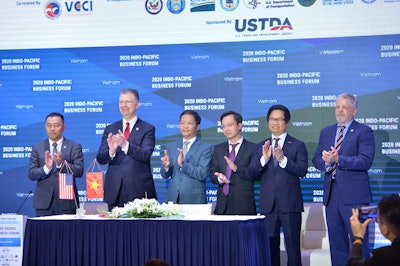
The U.S. Grains Council (USGC) and Vietnamese Ministry of Industry and Trade (MOIT) signed an official memorandum of understanding (MOU) this week on expanding the use and availability of ethanol in Vietnam.
The agreement promises to further a strong partnership between the two nations and encourage expanded ethanol use throughout Southeast Asia.
“USGC stands ready to support the MOU and the Vietnamese ethanol industry,” says Ryan LeGrand, USGC president and chief executive officer, who provided virtual remarks for the MOU signing. “The MOU helps further an already strong partnership between the U.S. and Vietnamese industries and governments. We thank the Vietnamese Ministry of Industry and Trade (MOIT), the U.S. Embassy and Consulate in Vietnam and the U.S. Department of Agriculture’s Foreign Agricultural Service (USDA’s FAS) for their ongoing dialogue and partnership.”
The MOU was signed during the 2020 Indo-Pacific Business Forum, which took place this week virtually and in-person in Hanoi, Vietnam. This year’s forum was aimed at advancing a vision for the Indo-Pacific region as a free and open region comprised of independent, strong and prosperous nations. Hosted by the U.S. Trade and Development Agency, the event is part of overall efforts to establish the United States as an essential and enduring partner to Southeast Asia.
During the event, USGC also participated in a panel discussion promoting an ethanol strategy for Southeast Asia. The panel included technical discussion on global ethanol production and the challenges and opportunities of developing effective policy and regulatory frameworks to support fuel standards that incorporate ethanol.
The ethanol MOU was one part of the series of 2021 strategic initiatives unveiled during the event intended to deepen economic ties through projects in the energy, transportation and healthcare sectors.
Vietnam was an ideal setting for this discussion following successful trade policy and market development initiatives related to ethanol. In July 2020, a decree by the Vietnamese prime minister went into effect that reduced the most-favored-nation (MFN) tariff rates, which are the lowest possible tariff a country can assess on another country with most favored nation status. This tariff reduction was the end-result of discussions between the Council and its ethanol industry partners with the Vietnamese government and industry stakeholders.
As a result, the MFN for denatured ethanol, with a blend of over 99% volume, decreased from 17 percent to 15 percent. Other denatured ethanol categories decreased from 20% to 15%, moves that were well received from the U.S. ethanol industry.
“USGC has worked in Vietnam for 25 years, including with the Vietnamese government and ethanol industry for several years as Vietnam began its most recent E5 policy in 2018,” LeGrand says. “The reduction in tariffs for ethanol has the potential to expand trade while still supporting Vietnamese farmers and agribusinesses.”
Vietnam does have a domestic ethanol industry, but the industry relies on locally grown cassava as a feedstock. Recently, USGC worked with the Tung Lam Company, Vietnam’s only ethanol-producing company, to partially convert its cassava-based ethanol production facilities to corn-based production to improve the economic efficiency of its plants.
Because local supplies cannot meet the total demand needed to achieve the country’s current E5 blend standard, the Vietnamese government is open to importing ethanol when domestic production is insufficient.
As a result of these joint efforts, U.S. ethanol exports to Vietnam increased 12% from January-August 2020 from the prior year despite COVID-19 market contractions, amounting to 2.72 million gallons (10.3 million liters, equivalent to 965,000 bushels) valued at $6.6 million.
这个潜在的市场将增长更多的如果Vietnamese government moves to an E10 blend mandate. That policy change would mean Vietnam could become a 218 billion-gallon (825 million liter) ethanol market, equivalent to 77.3 million bushels of U.S. corn.
“Vietnam recognizes the importance of working to a national 10 percent blend to provide predictability for further ethanol industry financial and technical investments,” LeGrand says. “Collaboration is important as we work together to share experiences from the U.S. ethanol industry and provide technical assistance to countries like Vietnam to ensure the ethanol market remains strong for the long term.”





















